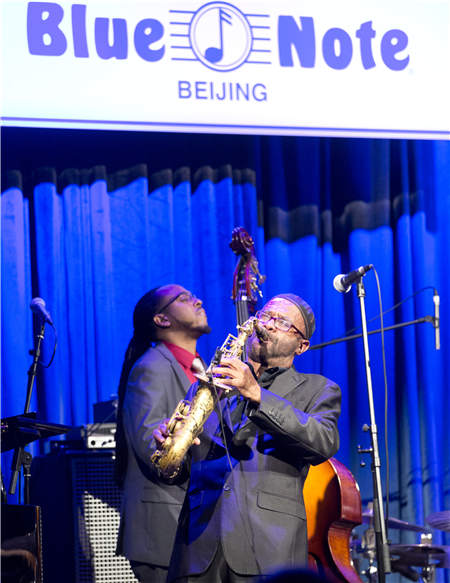 |
|
[Photo by Feng Yongbin/China Daily] |
Speaking of Blue Note's China debut, Garrett says: "This event is great for China in a lot of ways.
"With jazz performances on a regular basis, you can have the same experiences as American and Japanese audiences because we have Blue Note there."
According to Jason Lee, deputy director of Blue Note Beijing, the club, located at the renovated site of the former US embassy near Tian'anmen Square, will feature top international artists as well as home-grown jazz musicians with two performances every night except Mondays.
The two-floor venue of Blue Note Beijing is the biggest of all the Blue Note jazz clubs, with a space of around 2,600 square meters and a capacity to host 300 people.
Ticket prices will range from 150 ($22) to 400 yuan.
"This is a new and challenging beginning for China. We are offering a different live music and lifestyle experience like no one before in the capital," he says.
Shanghai had a vibrant jazz scene in the 1920s and 1930s. But for Beijing, the jazz scene is smaller. There are only four or five jazz performances venues in China, says Lee.
One of the most famous venues in China is the East Shore Jazz Cafe, Beijing's only music venue dedicated to jazz now, which was founded by one of the most established Chinese jazz musicians Liu Yuan in 2006.
Liu, 56, who showed up for Blue Note Beijing's opening along with his longtime friend, Cui Jian - the iconic Chinese rock musician - started out as a folk musician in his early 20s.
He learned the saxophone in the 1980s, and has been promoting and mentoring younger generation of Chinese jazz musicians since then.
Speaking of the latest development, he says that thanks to the internet, which enables young people to discover various kinds of music, and the visits of international jazz musicians like pianist Stefan Karlsson and guitarist John McLaughlin, who have performed in China, jazz is slowly taking root here.
Zheng Yu, the marketing director of Blue Note Beijing, who is also a diehard jazz fan, says unlike in the United States, where the majority of jazz fans are people in their 50s and older, in China the audience comprises mostly young students and white-collar workers.
According to Steven Bensusan, president of the Blue Note Entertainment Group and the son of Danny Bensusan, plans for Blue Note Beijing have been in the works since 2014 when veteran Taiwan songwriter and producer Jonathan Lee introduced Tian Tan, now the owner of Blue Note Beijing, to him.
Speaking about his future plans, Steven, who opened a club in Tokyo in 1988, followed by Osaka, Fukuoka and Nagoya, as well as Milan, says: "Right now we are in a major expansion mode, especially in the Asia-Pacific region."
He says there will also be educational programs like masterclasses that allow musicians to talk about their craft.
|
|
|
|
|
|
|
|
